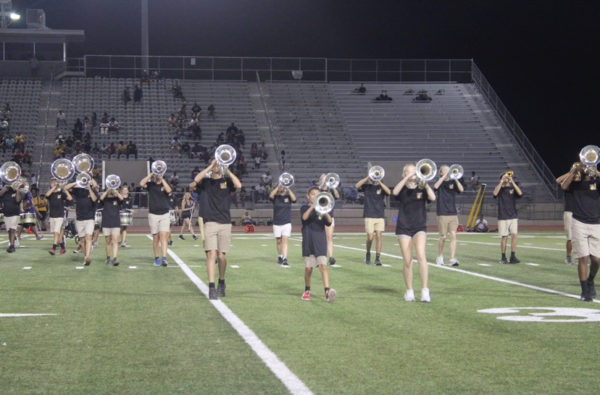Junior Perspective
One more year.
I have one more year until I walk across the stage; one more year until I receive my diploma; one more year until I start a new chapter in life.
The wording of this thought may differ from person to person, yet the overall hope remains the same.
The close of the school year approaches faster than expected. Worries over AP exams and finals, stresses over last-minute class assignments, and “up-to-here” attitudes dominate the minds of the student body. At the same time, plans for summer vacation form in excitement, and the days until the last day of school keep everyone in good spirits.
Well, almost everyone.
While the last day of school does indeed shed happiness and relief in the fact that it is finally over, the end of junior year makes me feel apprehensive about senior year. To ease my nerves, I try thinking in a hopeful way about all of the accomplishments of the previous years and all of the positive aspects of senior year.
Once school begins again after summer vacation, juniors such as I will be at the top of the high school hierarchy, looking down at all of the lowerclassment beneath our mountaintop of achievement. After all, we survived the construction era and the destruction of the Pavillion, Career Center, and the old Main Building. We witnessed the introduction of the laptops, the controversies of social media, and the birth of the online newspaper. We worked hard on class assignments, projects, and exams throughout the previous three years just to reach this position.
Even outside of school, we grew as people, learning more about ourselves. Friendships formed and soured, rivalries developed and ended, events out of our control happened to change something about our lives. Some dreams turned to passing phenomenon, with new aspirations taking their places. Each person went through something unique to himself or herself; no two experiences were exactly similar.
Along our high school journey, we watched other people experience senior year and listened as they told us about the good times and the bad times, the sturggles of classes, and the fun of social outings. Through their stories and advice, we formed our own opinions about senior year. We have one more year of high school left, and already we have impressions and fantasies about what we will do before we even had the chace to dive into it.
Just one more year until I can drive myself to school and perhaps go out of state for college. One more year until “fitting in” doesn’t seem so important. One more year until prom and senior skip day, and one more year until I start over, not as a teenager, but as an adult in the world.
Even though senior year promotes the joyful feeling of completing high school, it prepares one for college. Already college applications loom over our heads on the hooks of fishing poles, luring us with opportunities for scholarships, social interaction, and potential majors and minors. The universities cast before us the requirements for admission, and in order to reel in the acceptance letters, we have to chase down the requirements and meet them all the way.
The first semester of senior year primarily starts the college application process. It’s seen as a time to focus on which college to go to, what major to pursue, how much tuition costs, and what requirements are necessary (among other things). For juniors that haven’t considered any of those things and haven’t a single clue as to what to do after high school, it certainly promotes some apprehension.
Academic wise, senior year isn’t a free pass. Upperclassment and lowerclassmen have and continue to regard junior year as the toughest year of high school. This difficulty varies based on a few things: the types of classes one takes, the teachers one gets, the average grades one receives, and the amount of free time one has. A combination of little free time and difficult classes surely makes for a difficult year, and it’s true that taking an easier class would benefit the student. However, all the difficulty stresses the importance of balance, which is a necessity for the future. Senior year shouldn’t be a time to take the most rigorous courses; the challenges of junior year proved this. The work ethic still has to remain strong since colleges look at senior grades and senior finals for the semester and year. But the classes should explore personal interests and involve some amount of effort and engagement.
From a social standpoint, senior year includes homecomings, banquets, and the big events: prom and APE (after-prom extravaganza). It’s one thing to not go to social events due to a lack of interest or a busy schedule; it’s another to disregard them as a waste of time and money. The events don’t need to include big travelling groups, fancy limos, or expensive outfits and hairstyles as most media likes to portray them as. One could dress plainly, spend the least amount of money on dinner and transportation, and still have a good time with friends. Seniors don’t have to attend the events if they do not want to; they can still make the nights worth remembering by doing what they wish.
That senior year is just like any other year is an understatement. Senior year serves as a dash in a person’s timeline of his or her life. Who knows? Senior year could be the best year of high school or the worst. It shouldn’t be avoided or skipped, nor should it be over-glorified or over-stressed.
Still, a looming question remains. Considering all that we have accomplished, all that we have seen from the previous senior classes, all the assumptions and facts that we know or hear from others, does this guarantee that senior year will be great?
To an extent, yes and no.
Any year has its good points and bad points, its joys and apprehensions. Nothing is ever guaranteed. Making the most out of the year is the underlying goal of senior year, and it should be embraced with an open mind.












